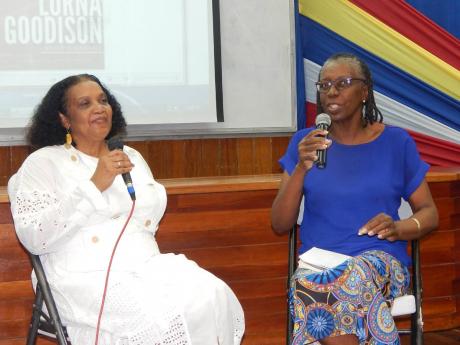Spotlight shines on two renowned poets
Arguably Jamaica’s best known poets, Louise ‘Miss Lou’ Bennett-Coverley and Lorna Goodison are in the cultural spotlight just now. As of the week of her 100th birthday anniversary on September 7, the former is being officially celebrated by the Government for 100 days, while the latter is both Jamaica’s current Poet Laureate and the writer-in-residence at The University of the West Indies, Mona.
During the past week, I attended two enjoyable and enlightening functions featuring the poetry and prose of both women. On Sunday, the UWI’s Department of Literatures in English presented ‘A Reading and Conversation with Lorna Goodison’ in the N1 Lecture Theatre. On the Thursday before, the National Library of Jamaica (NLJ) had invited the public to a multi-faceted function called ‘Unlocking the Miss Lou Archives.’
In the course of reading 15 or so of her wonderfully evocative poems and discussing her poetry, short stories and a memoir with Dr Anthea Morrison, former head of the Department of Literatures in English, Goodison gave some fascinating insights into her creative process.
She said that she didn’t choose to be a poet. “Poetry happened to me,” she stated, explaining that as a child, she spontaneously found herself writing poems, some of which she burnt. The audience gasped.
Later, as an adult, the process continued. “The Heartease poems [her 1988 collection] came with such intensity that if I was driving, I’d have to pull over,” she said. But she also spoke of a seemingly contradictory side to the process when she said, “The thing I dislike about [writing] poetry is that you have to work hard to make it seem as if you didn’t have to work hard [to get the finished product].”
Goodison was introduced by department head Dr Rachel Moseley-Wood, who revealed that a “critical issue” facing the Faculty of Humanities and Education, including her department, was that of declining numbers. The department has responded by offering new creative writing-related courses.
“In Literatures in English,” Moseley-Wood said, “we recognise that an increasing number of students are interested in honing their skills as creative writers.” Thus, a Bachelor of Arts (BA) degree programme in film studies was started last year; now being designed is a BA in writing, literature and publishing; and work is to begin soon on an master of fine arts in creative writing.
Moseley-Wood concluded her remarks with reference to yet another critical issue. “The department recognises that we have to remain current and address the needs of potential students,” she said, “even as we challenge a way of thinking that reduces tertiary education and a university degree to a mere passport to a job, and an activity that does not necessarily entail the development and expansion of the individual’s ability to think broadly and critically about the world in which he lives.”
Digitising Miss Lou’s works
One of the speakers at the NLJ function was Yulande Lindsay, manager of the library’s Audiovisual (AV) Department. She told the audience about the digitisation of 72 audio reel-to-reel tapes with Miss Lou’s recordings.
The 72 tapes, she told me, contain about 400 individual recordings of Miss Lou’s Views, a radio programme she did for RJR from 1966 to the late 1980s.Only a fraction of them have been digitised so far, Lindsay said, as the process is “challenging”.
The Miss Lou collection is part of a much larger body of some 4,900 audio reel-to-reel tapes in the AV department. That translates to thousands of programmes to be digitised and made accessible to the public, said Lindsay.
The NLJ also has an extensive film collection, with films from the Jamaica Broadcasting Corporation (JBC) which they rescued from the sidewalk, when the media house was being dissolved, and films made between 1950s and 1980s by the Jamaica Information Service and deposited at the library.
With evident pride, Lindsay said the films marked the beginning of “native broadcasts” in Jamaica. “We have the first film made by Jamaicans at the Jamaica Film Unit, the 1952 documentary Farmer Brown Learns Good Dairying,” Lindsay said. It’s also available on You Tube.
Among the entertainment material in the department, Lindsay said, is early film footage of the National Dance Theatre Company and Byron Lee and the Dragonaires in action, and of Jonkunnu and Jamaica Festival events. “On the audio side,” she added, “we have a lot of episodes of the RJR radio drama, Dulcimina: Her Life in Town and some episodes of Life in Hopeful Village and other radio dramas.
She made a special appeal. “We have no episodes of Ring Ding (the popular children’s television show Miss Lou hosted on JBC TV in the 1970s). For a librarian like myself, that’s a tragedy, apart from the fact that I watched Ring Ding as a child. It was the only children’s television show of its kind at the time. So if anybody has any episodes, or know of the whereabouts of any, please contact us.”
The Ring Ding tapes might have disintegrated, been taped over, thrown away or stolen, she said, adding, “I hope they were stolen. That way, they could still exist and might come to light some day.”

